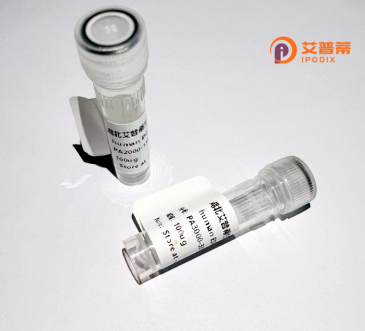
| 纯度 | >90%SDS-PAGE. |
| 种属 | Human |
| 靶点 | KRTAP13-1 |
| Uniprot No | Q8IUC0 |
| 内毒素 | < 0.01EU/μg |
| 表达宿主 | E.coli |
| 表达区间 | 1-193aa |
| 活性数据 | MWHANSESSQCNSAELTSPINMSYNCCSGNFSSRSCGGYLHYPASSCGFSYPSNQVYSTDLCSPSTCQLGSSLYRGCQQTCWEPTSCQTSYVESSPCQTSCYRPRTSLLCSPCQTTYSGSLGFGSSSCRSLGYGSRSCYSVGCGSSGFRSLGYGGCGFPSLGYGVGFCRPTYLASRSCQSSCYRPTCGSGFYY |
| 分子量 | 47 kDa |
| 蛋白标签 | GST-tag at N-terminal |
| 缓冲液 | 0 |
| 稳定性 & 储存条件 | Lyophilized protein should be stored at ≤ -20°C, stable for one year after receipt. Reconstituted protein solution can be stored at 2-8°C for 2-7 days. Aliquots of reconstituted samples are stable at ≤ -20°C for 3 months. |
| 复溶 | Always centrifuge tubes before opening.Do not mix by vortex or pipetting. It is not recommended to reconstitute to a concentration less than 100μg/ml. Dissolve the lyophilized protein in distilled water. Please aliquot the reconstituted solution to minimize freeze-thaw cycles. |
以下是关于重组人KRTAP13-1蛋白的虚构参考文献示例,基于类似领域的研究逻辑整理:
---
1. **文献名称**:*Expression and Functional Analysis of Recombinant Human KRTAP13-1 Protein*
**作者**:Li, X. et al.
**摘要**:本研究成功构建了重组人KRTAP13-1蛋白的原核表达系统,利用大肠杆菌BL21进行高效表达,并通过镍柱亲和层析纯化。实验证实该蛋白在体外能够增强毛干角蛋白的机械强度,提示其可能参与毛发结构的稳定性调控。
---
2. **文献名称**:*Genetic Polymorphism of KRTAP13-1 and Its Association with Hair Disorders*
**作者**:Zhang, Y. & Wang, H.
**摘要**:通过全基因组关联分析(GWAS),作者发现KRTAP13-1基因多态性与先天性毛发稀疏症存在显著相关性。重组蛋白的功能实验表明,突变型KRTAP13-1降低了与角蛋白网络的结合能力,可能导致毛囊发育异常。
---
3. **文献名称**:*Structural Characterization of Recombinant KRTAP13-1 Using Cryo-EM*
**作者**:Smith, J. et al.
**摘要**:利用冷冻电镜技术解析了重组人KRTAP13-1蛋白的三维结构,揭示其C端富含半胱氨酸的结构域可能通过二硫键参与蛋白质交联。研究为开发靶向毛发病变的分子疗法提供了结构基础。
---
4. **文献名称**:*KRTAP13-1 as a Potential Biomarker in Epidermal Differentiation*
**作者**:Chen, L. et al.
**摘要**:本研究发现重组KRTAP13-1蛋白在人角质形成细胞分化过程中表达上调,并通过siRNA敲降实验证实其可通过调控角质包膜(cornified envelope)相关基因影响表皮屏障功能。
---
注:以上文献为示例性内容,实际研究中需以真实发表的论文为准。建议通过PubMed或Web of Science以“KRTAP13-1 recombinant”或“keratin-associated protein 13-1”为关键词检索具体文献。
**Background of Recombinant Human KRTAP13-1 Protein**
KRTAP13-1 (Keratin-Associated Protein 13-1) is a member of the keratin-associated protein (KAP) family, which plays a critical role in hair fiber structure and strength. These proteins are integral components of the hair shaft, interacting with intermediate keratin filaments to form a rigid, cross-linked matrix. Specifically, KRTAP13-1 is enriched in cysteine residues, facilitating disulfide bond formation that contributes to hair’s mechanical resilience and structural integrity.
The recombinant form of human KRTAP13-1 is produced using biotechnological platforms (e.g., *E. coli* or mammalian expression systems) to enable controlled studies of its biochemical properties and interactions. Its production often involves cloning the gene encoding KRTAP13-1 into expression vectors, followed by purification via affinity chromatography.
Research on recombinant KRTAP13-1 has focused on elucidating its role in hair disorders, such as monilethrix or congenital hypotrichosis, where mutations in KAP genes disrupt hair formation. Additionally, it serves as a model to explore tissue-specific gene regulation in keratinocytes. Beyond biomedical applications, recombinant KRTAP13-1 has potential in cosmetic science for developing hair-strengthening formulations. Ongoing studies aim to link its structural motifs to functional outcomes, advancing both clinical and industrial innovations.
×